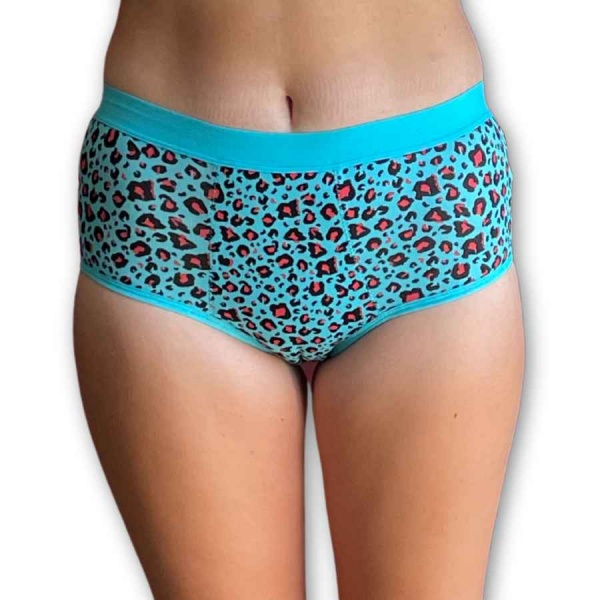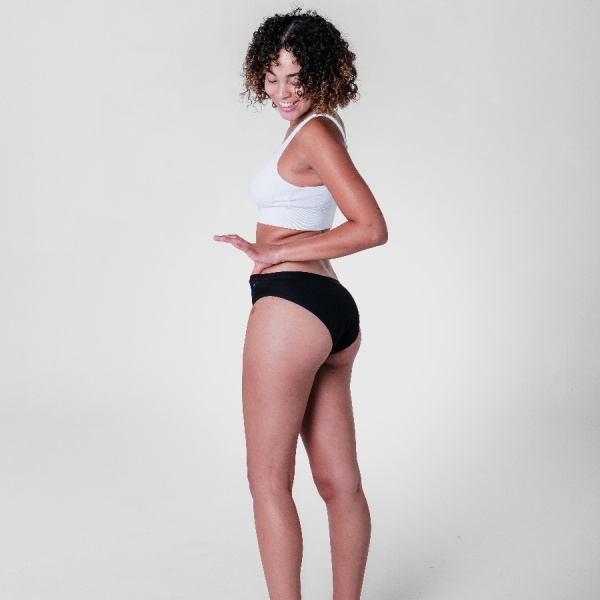PFAS Chemicals in Period Products: Everything You Need to Know
Here at Cheeky we've been all about 'Simple Reusables' since we launched our bestselling reusable baby wipes kit way back in 2008.
One of our main reasons for doing so (aside from reducing waste and saving money) was so that we could reduce the number of chemicals on delicate skin. I've suffered from eczema since I was a child, so this is something that has always been on my radar.
That's why when we introduced our range of reusable period products, it was super important to me that our period pants and reusable pads were as chemical as free as possible.
All Cheeky Pants are made of materials you would normally find in pants, with one addition of a heat bonded layer of waterproofing. We stayed away from 'antimicrobial' or 'antibacterial' additives as in my opinion they're just unnecessary and gimmicky.
What's more concerning is that some of these additives may also be harmful to us long term as they may contain PFAS. In our guide we look at everything you need to know about PFAS in period products and how to avoid them:
- What is PFAS?
- How Does PFAS Affect Women?
- Are PFAS in Period Products?
- How to Spot PFAS in Period Products
What is PFAS?
PFAS (perfluorooctanoic acid - PFOA or Per and polyfluoroalkyl substances) are a class of synthetic chemicals that includes PFOA and PFOS, and hundreds of other compounds which are known for their resistance to heat, water, and oil. These harmful chemicals are also called 'forever chemicals' as they stick around forever!
Due to these properties, PFAS chemicals are widely used in products such as non-stick cookware, water-repellent clothing, food packaging, firefighting foam and even some cosmetics. These “forever chemicals” do not easily break down, leading to long-term environmental and health concerns.
The biggest issue with PFAS is that they are persistent in the environment, building up in soil, water sources, and wildlife over time.
Since they don’t degrade naturally, PFAS can accumulate in our ecosystems and bodies, posing real ecological risks.
Research has linked PFAS in the environment to soil contamination, aquatic toxicity, and threats to biodiversity. As these chemicals cycle through water sources, they spread even further, posing a contamination risk for tap water and drinking water, potentially affecting millions of people worldwide.
The impact on human health is concerning as well. In the United States the centers for disease control and prevention believe that the risks over the health outcomes for those exposed to pfas may be underestimated.
Once in the body, types of PFAS can persist in organs and tissues, affecting key systems over time. Studies have associated PFAS with increased risks of health impact problems including cancer, liver damage, immune system disorders, and reproductive health issues.
A 2020 study published in Environmental Health Perspectives highlighted that high levels of PFAS exposure could disrupt immune functions, making individuals more vulnerable to infections and illnesses (source: Environmental Health Perspectives).
The widespread use and persistence of PFAS create ongoing challenges for both environmental and human health, underlining the importance of reducing exposure wherever possible.
How Does PFAS Affect Women?
For women, PFAS exposure has unique and troubling implications, especially in relation to reproductive and menstrual health. Research indicates that PFAS can interfere with hormone function, impacting the endocrine system, which is crucial for regulating menstrual cycles and reproductive health. In particular, PFAS exposure has been associated with changes in oestrogen levels and may contribute to ovarian aging.
A study published in Reproductive Toxicology found that PFAS chemicals can lead to reduced fertility by accelerating ovarian aging and impacting egg quality (source: Reproductive Toxicology).
Moreover, PFAS have been linked to irregular menstrual cycles and potential ovarian disorders, including polycystic ovary syndrome (PCOS).
A 2018 study found a correlation between PFAS exposure and Polycystic Ovarian Syndrome (PCOS), suggesting exposure to high levels of PFAS in drinking water was associated with increased risk of PCOS (source: International Journal of Hygiene and Environmental Health).
Research has shown that PFAS can pass from mother to child through the placenta and breast milk, potentially impacting development of your child and increasing health risks for infants.
For women thinking of having children, the accumulation of PFAS is a significant concern not only for their health but also for future generations.
Are PFAS in Period Products?
PFAS have no real reason to be present in period products, however that isn't to say that they aren't there.
Investigations have shown that some period products, including pads, panty liners, tampons and period pants, have tested positive for fluorine, a marker for PFAS.
A 2023 report from the American Chemical Society showed that some period products contained fluorine, suggesting the presence of PFAS (source: American Chemical Society).
One problem is that testing for PFAS specifically is expensive and difficult, so researchers usually test for organic fluorine instead. Organic fluorine can indicate the likelihood of PFAS presence, though it is not definitive.
Testing by Mamavation and Environmental Health News in 2022 found PFAS in multiple period products, including popular brands of pads, panty liners, and reusable incontinence pads.
All of this science raises questions about the impact of exposure to these chemicals during menstruation. That's because so much blood travels through and around the vaginal and vulvar tissues.
The concern is that for women who use period products regularly, even trace amounts of PFAS may accumulate over time.
Studies suggest that prolonged contact with PFAS-containing materials could increase overall chemical exposure. That's why it’s essential to seek out products that are transparent about their materials and manufacturing practices.
How to Spot PFAS in Period Products
To spot PFAS in period products, look for period products that explicitly state they are PFAS-free.
Many companies are aware of this issue and as such are much more transparent about their materials, so consider brands that confirm they are PFAS free.
Cheeky Pants, for instance, provides a selection of PFAS-free period products, including period pants for light flow, normal flow, and heavy flow, ensuring safe options for a variety of needs.
Avoid products with vague ingredients like “water-resistant agents,” or 'antimicrobial technology' as these can sometimes be code for PFAS-based treatments.
Recommended PFAS Free Period Pants
Wrap Up
The concern over PFAS in period products is real, especially given the potential health implications for women.
Staying informed and choosing PFAS-free products can help you manage these risks while supporting a healthier lifestyle. For more information on PFAS-free period products, visit our period pants for heavy flow or check out our complete collection of period pants in the UK.
If you have any questions about our PFAS free pants or pads, or are looking for the best products for your needs, feel free to reach out to us or dive deeper into our blog.
The team all use our products themselves and chat pee, poo and periods all day. Nothing is TMI and we love hearing about your experiences and answering your questions, helping people ditch disposables.
Alternatively, explore other blogs which you may be interested in:
- Are the materials used in UK period pants safe?
- Tampons vs Pads: Which is safest?
- The best overnight period underwear
About the Author: Helen Rankin founded Cheeky Wipes, the original reusable wipes kit back in 2008 after disposable wipes caused her eczema to flare up. 4 kids later, internal period protection such as tampons or menstrual cups were no longer an option for her and she went on to develop their range of 'Simple Reusables' to include period pants, reusable nappies and reusable sanitary pads.
The Cheeky customer services team pride themselves on providing honest, friendly advice and just LOVE to chat pee, poo and periods all day long, helping people make the switch to reusables! The Company was recognised for their hard work in developing environmentally friendly products with the Queens Award in Enterprise for Sustainable Development in 2021.
.jpg)
(1).jpg)
(2).jpg)

.jpg)
.jpg)

.jpg)
.jpg)
.jpg)
.jpg)
.jpg)


.jpg)

.jpg)